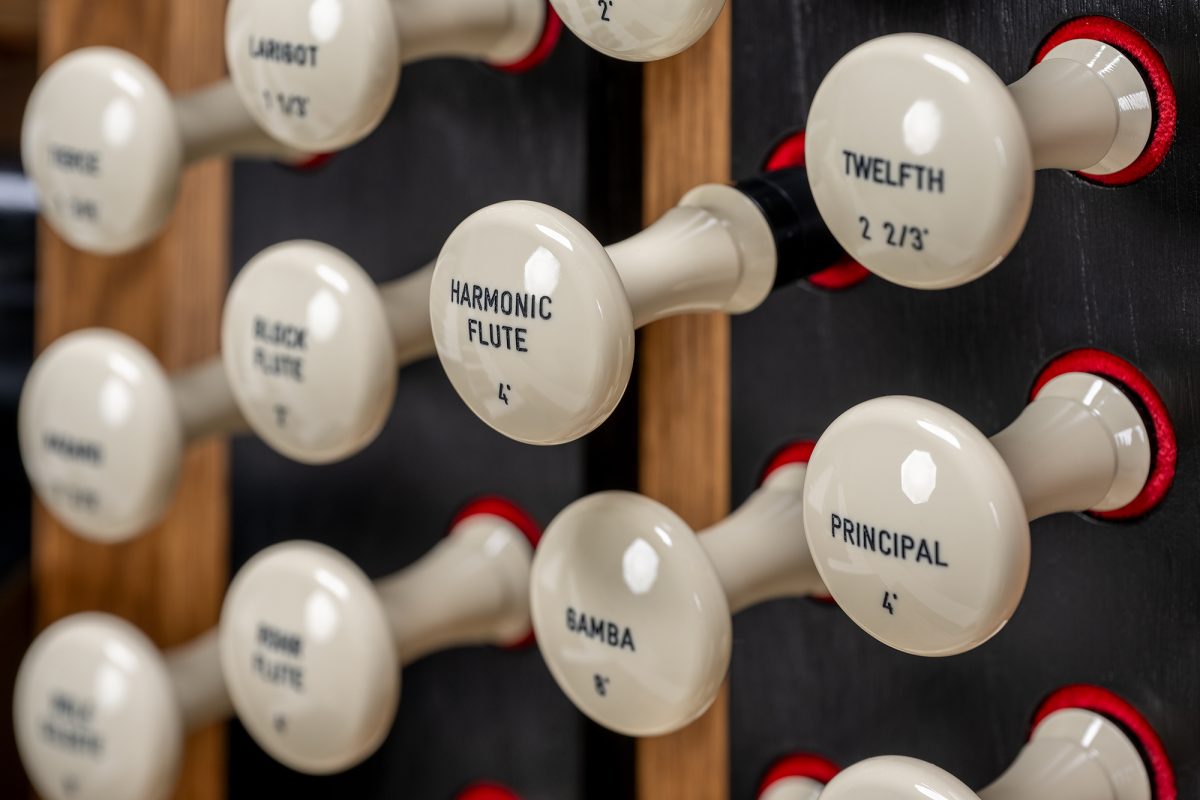In late 2023 Makin formally announced a major upgrade to their range of instruments. Named after lakes in the Lake District as an acknowledgement to Makin founder Mr John Pilling (1915 – 1996) who lived in and loved the Westmorland area, the Rydal 2-25, Thirlmere 2-36, Windermere 3-53 and Derwent 4-68 are all in beautifully designed and built consoles, with specifications designed by Professor Ian Tracey (Liverpool Cathedral) and Dr Keith Harrington (Managing Director). Much time was spent on the development of the ergonomic design of the consoles to ensure the best playability possible; everything is designed to be in the correct place, within easy reach and for simplicity of use.
The discerning English organist has a list of functions which are not shared by organists from other international schools but which are seen as essential here. Examples of these include octave/suboctave couplers, the ‘Great & Pedal Combinations Coupled’ facility, stops in columns of two (never three) and a plethora of divisional as well as general pistons. These of course have been included as standard on all our instruments for many years but in these new instruments we have also included many new options such as a Great Reeds on Choir transfer on the Windermere, split divisional and general piston memories on drawstop organs and much, much more.
Enhanced options on new Makin models
With the development of a whole new series of models and after a great deal of thought and planning, Makin has introduced several new features which, when used by organists, will provide significant benefits e.g. allowing for easier and more responsive control of the instrument to meet and exceed needs. Whilst some of these features are new, others have been available by use of software in the past. However with the new DS-Core hardware and software platform these can all be easily managed by the user according to their needs and indeed taste.
These new functions include:-
Memory 1 set as a standard
When the organ is first turned on, it defaults to memory level one for Divisional and General Pistons. The stop selection for each piston has been set as a standard. The idea behind this approach is to ensure that whoever comes to play the instrument can simply turn it on and then play it with the knowledge that they have a standard set of pistons set as they would expect.
Large Number of Memories
The Rydal has 125 memory levels. The Thirlmere, Windermere and Derwent models have 250 memory levels and can also access 999 via a USB pen stick.
Piston Sequencer
By using the associated Next and Previous pistons the organist can move through the general pistons. This is a standard feature on Drawstop models and optional on Tabstop instruments.
Separate Divisional and General Memories
Using the Gen and +/- pistons you move the general memory up/down to a different memory level whilst the division memory remains where it was. In this way only one set of divisional pistons need be set for the organ with multiple sets of general pistons being used. This is a great time saving devise and ideal for use in combination with the piston sequencer. This is a standard feature on Drawstop models and optional on Tabstop instruments.
From within the menu you can control:
Chorus Effect
The Chorus or in tune/out of tune effect can be set up as the default. Whilst many organists want the instrument to be fully in tune, others want a little variation in the tuning. How the organ starts up is now user controllable.
Tremulant Settings
Both the speed and depth of each tremulant can be individually set. So if you wish, cinema effects can be obtained with high speed and deep tremulant.
Swell Pedal Assignment
Any Swell Pedal can be assigned to options including Gt/Ped, Choir, Swell, Solo and Crescendo.
Crescendo Pedal
A Crescendo pedal can be set for the entire instrument. With 21 stages which you control and set, stops are added and subtracted as you wish. As you press the pedal, corresponding stops illuminate (Tabstop) or move (Drawstop) as appropriate. This is no longer a ‘blind’ feature.
Solo Reed Enclosed
The big solo reeds can be enclosed in the Choir (or Solo) boxes or not as appropriate. This feature is for Windermere and Derwent models only.
Solo Reeds Coupling
Octave and interdivisional couplers can work with the big solo reeds, or not. This feature is for Windermere and Derwent models only.
Keyboard Transfer
Ideal for those who wish to play French music and use the organ in the French way, or perhaps for those who may be practicing before visiting France. The Choir and Great Keyboards can be exchanged … remember that French organs have the lowest keyboard as the Grand which is the equivalent of our Great.


